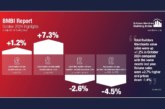
A recovery plan to help protect and bolster housing delivery in London that the Builders Merchants’ Federation contributed to has been published by one of London’s Deputy Mayors.
The 60-page report is from the Covid-19 Housing Delivery Taskforce that was brought together and convened by Tom Copley, Deputy Mayor for Housing and Residential Development, to consider the challenges posed by the pandemic and to plot a route to recovery.
Between April and July 2020, the Taskforce concentrated on practical ways to meet the huge need for housing in London, to protect affordable housing delivery, and to give confidence to private house-builders to start new developments. Among its main findings was a call for urgent Whitehall funding to finance a ‘buyer of last resort’ scheme to provide certainty and confidence.
The Taskforce recommended that a £3½ billion ‘buyer of last resort’ scheme would allow borough councils and housing associations to buy unsold private homes at cost price – and turn them into social housing if a buyer cannot be found on the open market. This would guarantee the delivery of up to 9,200 homes between 2020 and 2022, according to the Taskforce. But it was felt this option will not be taken often as the builder’s main motive is to sell at a profit. The buyer of last resort would only be triggered in cases where new homes cannot return a profit on the open market.
Brett Amphlett, BMF Policy and Public Affairs’ Manager, served on the Experts’ Panel to the Taskforce, commented on the publication of the Recovery Plan:
“In the post-Brexit and post-Covid 19 economic recovery, the BMF welcomes all efforts to keep building much-needed new homes of all types. We were pleased to see SMEs, as customers of merchants, recognised by the Taskforce in its findings. We see scope for smaller builders to play a much greater role in meeting housing need by developing small local sites. London has relied on large projects to meet housing need. But they take several years to complete owing to size, complex financing, and absorption rates into local markets”.
“Small sites can be completed quickly, often without huge upfront capital investment. Taken together, small sites contribute a few homes in many locations that people want to buy that cumulatively all helps to narrow the gap between demand and supply”.
Other strong themes from this report of relevance to BMF members were:
- Higher uptake of modern methods of construction including precision-manufactured housing – perhaps by (a) London-based housing providers combining to bulk purchase innovative and conventional building components to achieve economies of scale or (b) direct public investment by the Mayor in a precision-manufactured housing factory.
- The Greater London Assembly and London Boroughs should incentivise Building Information Management (BIM) and digital project management in public tenders to cause wider adoption of digitalisation throughout the supply chain.
How politicians will meet the huge need for housing in London is set to be a major issue in the Mayoral Election in eight months’ time. The ballot was to take place in May this year but like other elections, it was put back a year until 6 May 2021 due to Covid-19.









